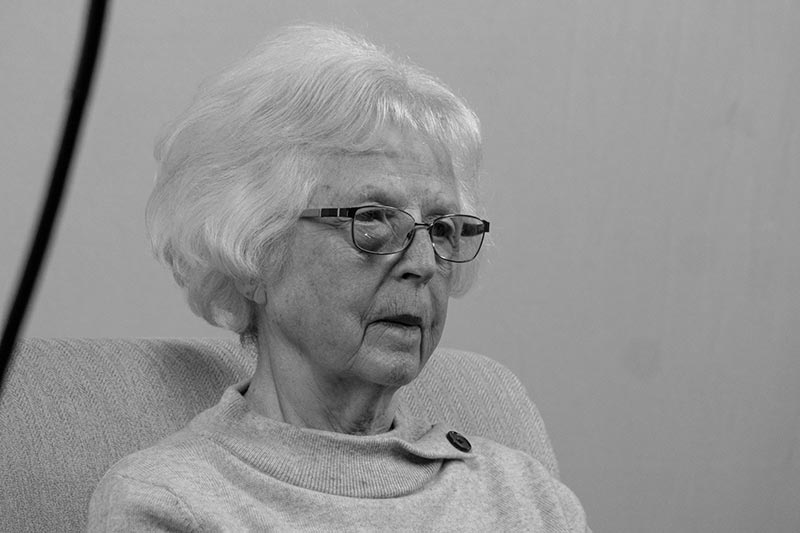Dimensions in Testimony Reaches Milestone of 50 Interactive Interviews

In February 2012 Holocaust survivor Pinchas Gutter sat down inside a light stage surrounded by 50 cameras and 6,000 LED bulbs to give his testimony to the USC Shoah Foundation’s Visual History Archive.
Gutter’s interview was the first proof of concept of Dimensions in Testimony (DiT), a groundbreaking new technology that enables viewers to pose questions to survivors like Gutter and hear their responses in real-time, lifelike conversation.
Fast forward to London in 2021, and Agnes Kaposi—a Holocaust survivor who lived through the Debrecen ghetto and labor camps in Austria—sits inside a similar light stage and answers hundreds of questions in Hungarian, thereby completing the 50th DiT interview.
In the intervening years DiT has gone from strength to strength, debuting with a permanent installation featuring Gutter at the Illinois Holocaust Museum and Education Center in 2015 and going on to feature at museums around the world.
The technology first developed by Conscience Display and the USC Institute for Creative Technologies has also evolved, adding innovations such as specially designed mobile rigs equipped with green screens and multi-camera set ups to bring DiT to Holocaust survivors and others witnesses to genocide wherever they may be.
The 50 DiT interviews conducted to date were accomplished in nine languages—English, French, German, Hebrew, Hungarian, Mandarin, Russian, Spanish and Swedish—across eight partnership countries.
Along with Jewish Holocaust survivors, participants have included U.S and Red Army liberators, a Nuremberg Prosecutor, a Nanjing Massacre survivor, a “comfort woman”. These interviews have been covered by major media outlets including CNN, The New York Times, The Washington Post, and CBS’s 60 Minutes, which won a 2021 Gracie Award for its “Talking to the Past” segment on DiT.
The innovative, groundbreaking technology has also drawn praise from participants and viewers alike.
"We survivors feel that when we are gone, our story is gone," Holocaust survivor and DiT interviewee Aaron Elster told the Chicago Tribune in 2017. "I'm hoping that many, many years from now, people will still be able to speak with me. That I will be able to answer questions for them, that I'll make the Holocaust more than just a story."
Audience evaluations of the DiT experience have also been positive, with feedback demonstrating that interaction with DiT exhibits help museum audiences and students develop empathy and gain understanding and skills that motivate and inspire them to be more responsible citizens in society.
Dr. Kori Street, Interim Executive Director of USC Shoah Foundation, said DiT enables people to be agents in their own learning.
“We know from research that Dimensions in Testimony encourages audiences to be active participants in driving the direction and nature of the interactions, which in turn leads to broader and deeper learning,” Dr. Street said.
Looking ahead, Anne Kelly, Interim Collections Manager overseeing Dimensions in Testimony, said DiT will continue “to pursue new testimonies and partnerships that align with the mission statement of the USC Shoah Foundation.”
Up next will be the filming of two South Florida Holocaust survivors in partnership with The Holocaust Documentation & Education Center & Museum (HDECM) in Dania, Florida.
For more information and visuals about Dimensions in Testimony please visit: https://sfi.usc.edu/dit
Dimensions in Testimony was developed in association with Illinois Holocaust Museum and Education Center, with technology by USC Institute for Creative Technologies, and concept by Conscience Display. Funding for Dimensions in Testimony was provided in part by Pears Foundation, Louis. F. Smith, Melinda Goldrich and Andrea Cayton/Goldrich Family Foundation in honor of Jona Goldrich, Illinois Holocaust Museum and Education Center, and Genesis Philanthropy Group (R.A.). Other partners include CANDLES Holocaust Museum and Education Center.